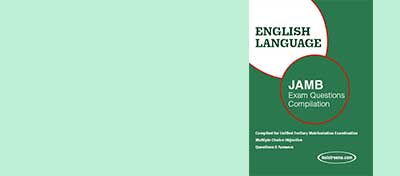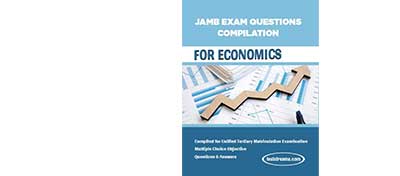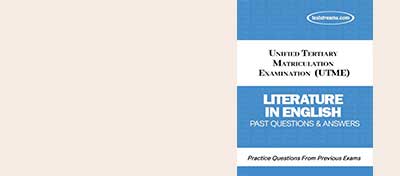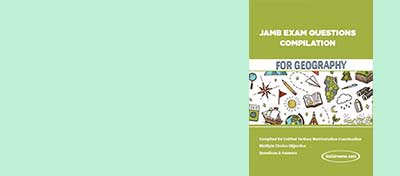Mastering English Language: Your Key to Success with JAMB Past Questions and Answers
Are you preparing for the Joint Admissions and Matriculations Board (JAMB) examination and feeling unsure about tackling the English Language section? Don’t worry; we’ve got you covered! Dive into our comprehensive collection of JAMB Past Questions and Answers for English Language, meticulously crafted to help you ace your exam with confidence.
Our repository of JAMB English Language past questions offers a treasure trove of valuable resources to sharpen your language skills and boost your exam readiness. With a diverse range of topics, including comprehension passages, grammar rules, vocabulary usage, essay writing, and more, our extensive collection covers every aspect of the English Language syllabus.
Jamb Syllabus for Use of English 2024
This Jamb Use of English Syllabus provides guides to all candidates who register to sit for the Unified Tertiary Matriculation Examination (UTME) on the content of the English Language to be tested in the examination.
The examination is designed to test the knowledge of candidates in any and every aspect of the syllabus developed for Use of English. It is therefore expected that candidates for the UTME must have adequate knowledge covering the entire syllabus of the English Language subject
Jamb Syllabus for Use of English 2024/2025 Download
Get access to the complete Jamb syllabus for Use of English 2024/2025 here. This Jamb Use of English Syllabus is where the Jamb Use of English questions for the 2024 Jamb exam will be set from.
Kindly make time to study all topics on this Syllabi, and don’t forget to read the Jamb 2024 Novel, The Life Changer, as some critical questions will be set from there too.
Table of Contents
Jamb Syllabus for Use of English 2024/2025
This Jamb Use of English Syllabus provides guides to all candidates who register to sit for the Unified Tertiary Matriculation Examination (UTME) on the content of the English Language to be tested in the examination.
The examination is designed to test the knowledge of candidates in any and every aspect of the syllabus developed for Use of English. It is therefore expected that candidates for the UTME must have adequate knowledge covering the entire syllabus of the English Language subject.
Particular attention must be paid to recommended books and literature for some subjects, as questions would be set from such references in the 2024 Jamb UTME.
In order to encourage the culture of reading, a compulsory recommended book is usually sold to every candidate at the point of registration. The book’s content is tested as part of the questions in the Use Of English which is compulsory for every candidate. Therefore, every candidate is advised to ensure that he/she is given a copy of the book at the point of registration.
USE OF ENGLISH
1. GENERAL OBJECTIVES
The aim of the Unified Tertiary Matriculation Examination (UTME) syllabus in Use of English is to
guide candidates in their preparation for the Board’s examination. It is designed to evaluate the
candidates’ ability to:
- communicate effectively in both written and spoken English; and
- Use English Language for learning at the tertiary level.
2. The syllabus consists of three sections:
- SECTION A: Comprehension and Summary
- SECTION B: Lexis and Structure
- SECTION C: Oral Forms
3. DETAILED SYLLABUS/CONTENTS
TOPICS/CONTENTS/NOTES
A. Comprehension and Summary
- (a) description
- (b) narration
- (c) exposition
- (d) argumentation/persuasion
- (i) Each of the three passages to be set (one will be a cloze test) should reflect various disciplines and be about 200 words long.
(ii) Questions on the passages will test the following:
- (a) Comprehension of the whole or part of each passage.
- (b) Comprehension of words, phrases, clauses, sentences, figures of speech, and idioms as used in the passages.
- (c) Coherence and logical reasoning (deductions, inferences, etc).
- (d) Approved Reading Text (The Life Changer by Khadija Abubakar Jalli).
(e) Synthesis of ideas from the passages.
NOTE: Synthesis of ideas means the art of combining distinct or separate pieces of information to form a complete whole as summary.
OBJECTIVES
Candidates should be able to:
- i. identify main points/topic sentences in passages;
- ii. determine implied meanings;
- iii. identify the grammatical functions of words, phrases, clauses, and figurative /idiomatic
- expressions; and
- iv. deduce or infer the writers’ intentions including mood, attitude to the subject matter, and opinion.
B. Lexis and Structure
- (a) synonyms
- (b) antonyms
- (c) clause and sentence patterns
- (d) word classes and their functions
- (e) mood, tense, aspect, number, agreement/concord, degree (positive, comparative, and superlative), and question tags
- (f) mechanics
- (g) ordinary usage, figurative usage, and idiomatic usage.
NOTE: Idioms to be tested are those that are formal and expressed in Standard British English. (SBE).
OBJECTIVES
Candidates should be able to:
- i. identify words and expressions in their ordinary, figurative, and idiomatic contexts;
- ii. determine similar and opposite meanings of words;
- iii. differentiate between correct and incorrect spellings;
- iv. identify various grammatical patterns in use;
- v. interpret information conveyed in sentences.
C. Oral Forms
- (a) Vowels (monothongs, diphthongs and triphthongs)
- (b) Consonants (including clusters)
- (c) Rhymes (including homophones)
- (d) Word stress (monosyllabic and polysyllabic)
- (e) Emphatic stress (in connected speech)
NOTE: Emphatic stress involves the placement of stress on words in an utterance for the purpose of emphasis.
OBJECTIVES
Candidates should be able to:
- i. make distinctions among vowel types;
- ii. differentiate among consonant types;
- iii. identify correct pronunciation of individual words and articulation of connected speech.
D. THE STRUCTURE OF THE EXAMINATION
SECTION A: Comprehension and Summary
| (a) | 1 comprehension passage | 5 questions |
| (b) | 1 cloze passage | 10 questions |
| (c) | 1 reading text | 10 questions |
SECTION B: Lexis and Structure
| (a) | Sentence interpretation | 5 questions |
| (b) | Antonyms | 5 questions |
| (c) | Synonyms | 5 questions |
| (d) | Basic Grammar | 10 questions |
SECTION C: Oral Forms
| a | Vowels | 2 questions |
| b | Consonants | 2 questions |
| c | Rhymes | 2 questions |
| d | Word Stress | 2 questions |
| e | Emphatic Stress | 2 questions |
Total: 60 questions
Recommended Textbooks for Jamb Use of English 2024
- Adedimeji, M. A (2021) Doses of Grammar. Patigi. Ahman Pategi University Press.
- Attah, M. O. (2013). Practice in Spoken English for Intermediate and Advanced Learners. Maiduguri: University of Maiduguri Press.
- Bamgbose, A. (2002). English Lexis and Structure for Senior Secondary Schools and Colleges (Revised Edition). Ibadan: Heinemann.
- Banjo, A., Adeniran A., Akano, A. and Onoga, U. (2004) New Oxford Secondary English Course Book six for Senior Secondary Schools. Ibadan: University Press Plc.
- Caesar, O. J. (2003). Essential Oral English for Schools and Colleges. Lagos: Tonad Publishers Limited.
- Jones, D. (2011). Cambridge English Pronouncing Dictionary. Cambridge: Cambridge University Press.
- Egbe, D. I (1996). Mastering English Usage and Communication Skills. Lagos: Tisons.
- Elugbe, B. (2000). Oral English for Schools and Colleges. Ibadan: Heinemann.
- Grant, N. J. H., Nnamonu, S. and Jowitt, D. (1998) Senior English Project 3. (New Edition) Harlow: Longman.
- Idowu., O. O., Sogbesan, T. S., Adofo, A. K., Burgess, D. F. and Burgess, L. J. (1998) Round-up English: A Complete Guide, Lagos: Longman.
- Idris, U. (2001). Oral English at Your Fingertips for Schools and Colleges. Lagos: M. Youngbrain Publishers.
- Igiligi, E. C. and Ogenyi, S. O. (2010) Grammar and Composition in the G.S.M. Age. Enugu: Joe Hills Production Services.
- Jauro, L. B. (2013). Oral English for Schools and Colleges: A Teaching and Learning Approach. Yola: Paraclete Publishers.
- Nnamonu, S. and Jowitt, D. (1989) Common Errors in English. Lagos: Longman.
- Obinna, M. F. (2001) University Matriculation Use of English. (Fourth Edition). Port Harcourt: Sunray Books Limited.
- Ogunsanwo, O., Duruaku, A. B.C., Ezechukwu, J. and Nwachukwu, U. I. (2005) Countdown English Language (Revised Edition). Ibadan: Evans Brothers.
- Olatoye, S. (2006) The Silent Teacher. Ado-Ekiti: Segun and Sons Enterprises.
- Oluikpe, B. O. A., Nnaemeka, B. A., Obah, T. Y., Otagburuagu, E. J., Onuigbo, S. and Ogbonna, E. A. (1998) Intensive English for Senior Secondary School 3. Onitsha: Africana. First Publishers.
- Tomori, S. H. O. (2000) Objective Tests for School Certificate English: Practice in Lexis, Structure, and Idiom (Reprinted Edition). Ibadan: Heinemann.
- Ukwuegbu, C., Okoro, O., Idris, A. U., Okebukola, F. O. and Owokade, C. O. (2002) Catch-up English for SSCE/UME. Ibadan: Heinemann.
Why waste time scrambling to find reliable study materials when you can access everything you need in one convenient place? Whether you’re aiming to improve your comprehension skills, enhance your grammar proficiency, or refine your essay writing abilities, our JAMB English Language past questions and answers provide the perfect platform for focused and effective preparation.
Each question is accompanied by detailed explanations and answers, allowing you to understand the rationale behind each correct response. This not only reinforces your understanding of key concepts but also equips you with the strategies needed to tackle similar questions on exam day.
Moreover, our JAMB English Language past questions are designed to simulate the format and difficulty level of the actual exam, ensuring that you’re well-prepared for whatever challenges you may face. By familiarizing yourself with the exam structure and practicing with authentic questions, you’ll be able to approach the JAMB English Language section with confidence.
Encouragement Note: Preparation is key. Start early, stay consistent, and seek help when needed. The journey to acing your exam is a marathon, not a sprint. With dedication and the right approach, you can achieve your desired score.





No Responses